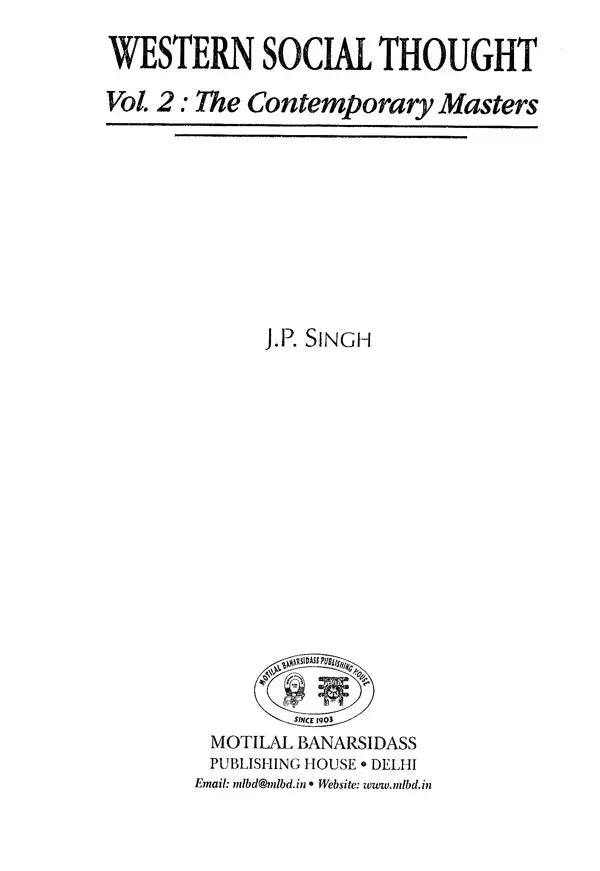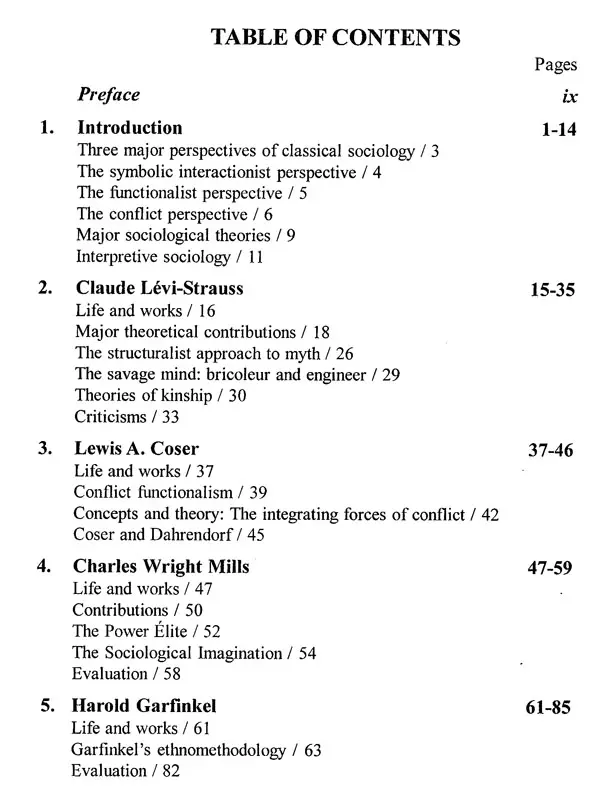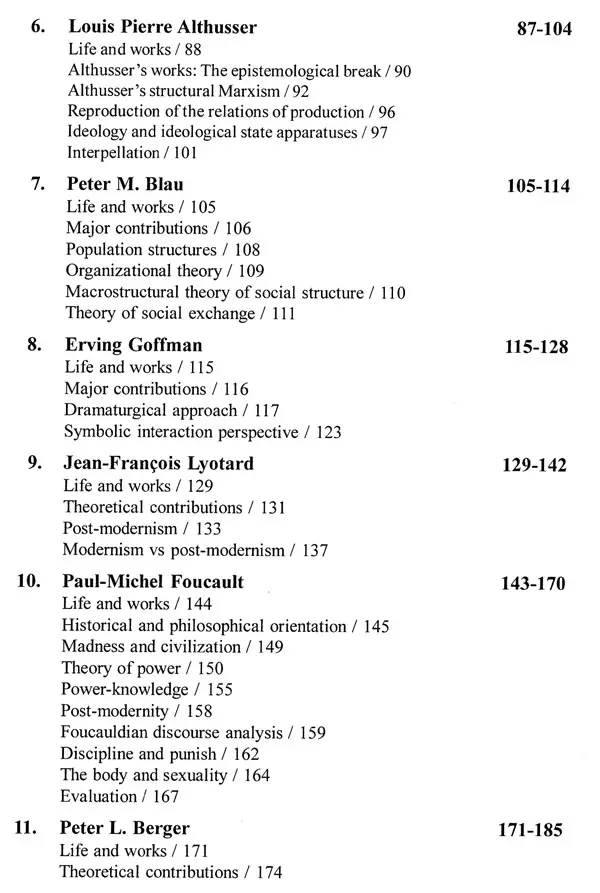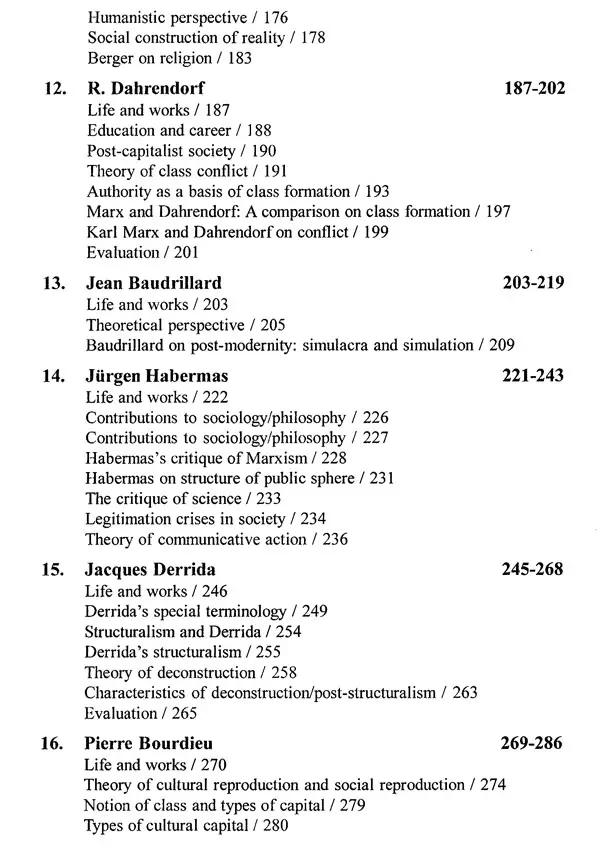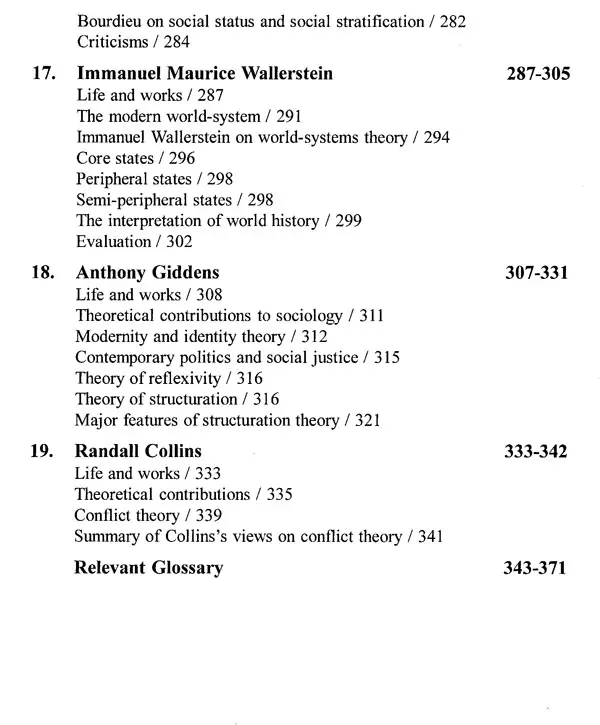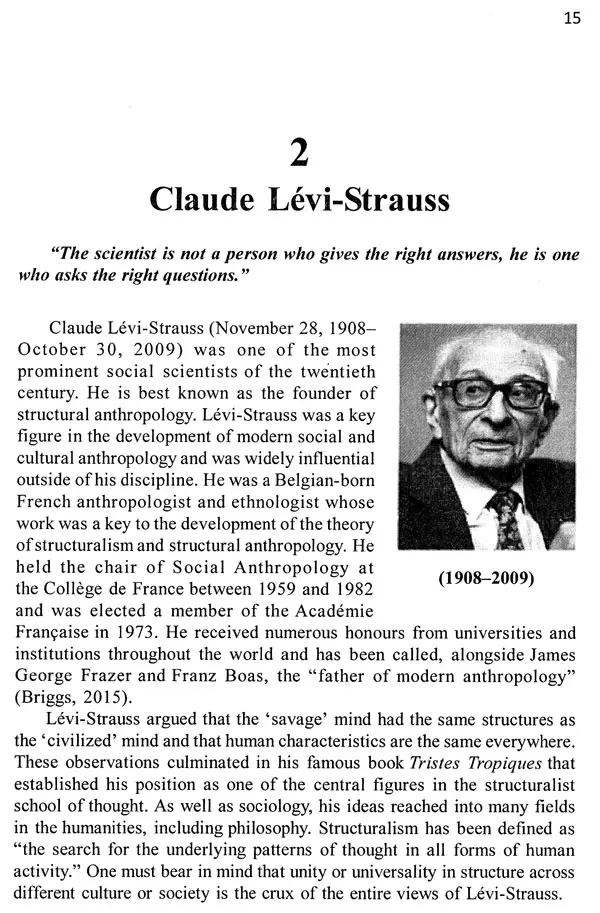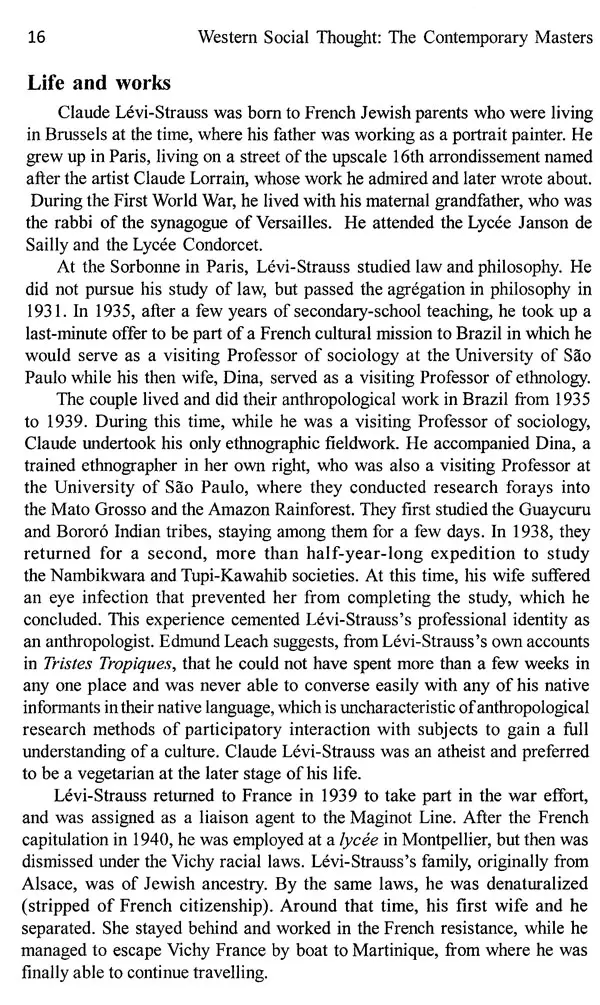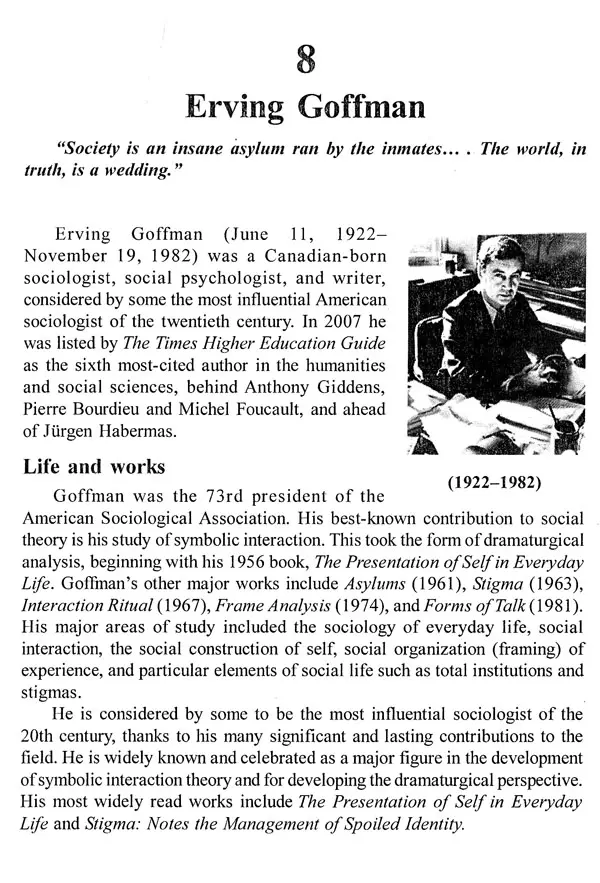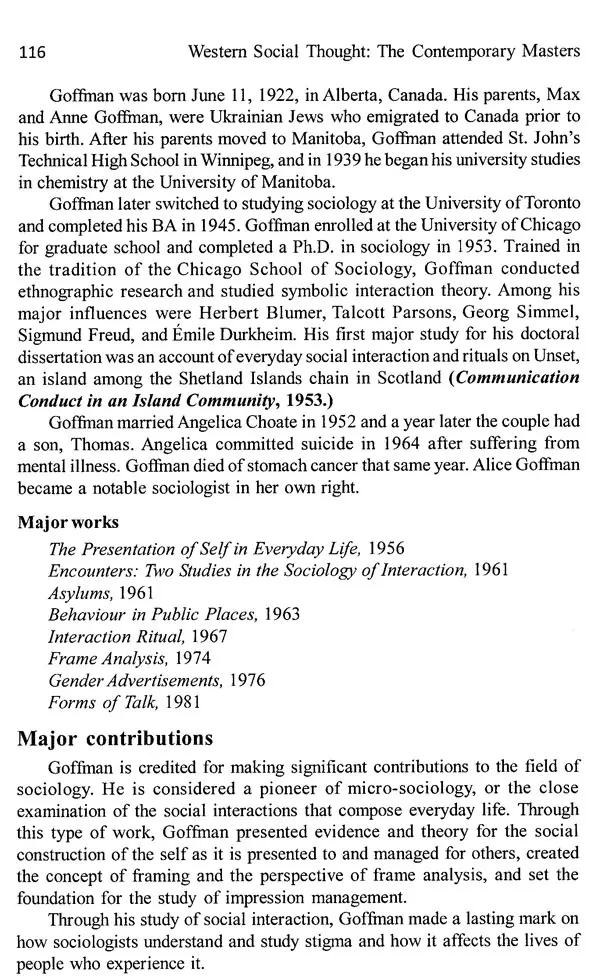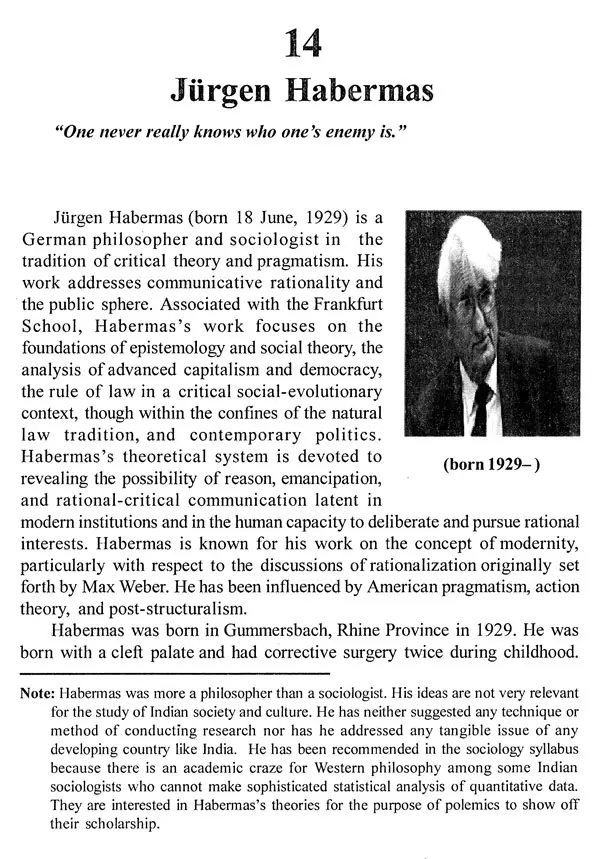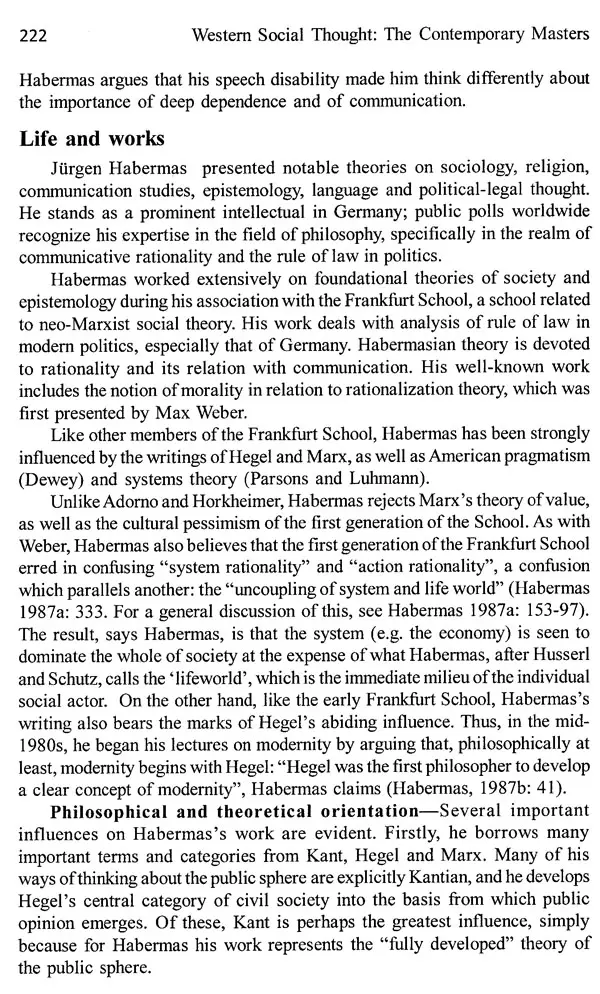
Western Social Thought- The Contemporary Masters (Vol-II)
Book Specification
| Item Code: | UAL999 |
| Author: | J. P. Singh |
| Publisher: | Motilal Banarsidass Publishing House, Delhi |
| Language: | English |
| Edition: | 2021 |
| ISBN: | 9789391430832 |
| Pages: | 371 |
| Cover: | PAPERBACK |
| Other Details | 8.50 X 5.50 inch |
| Weight | 360 gm |
Book Description
In this book an effort has been made to offer students a lively and critical introduction to contemporary sociology. It is written with a range of students in mind. It will also be of interest to anyone curious about the nature of cotemporary sociology in the West.
The book critically examines the major contemporary social thinkers from Claude Lévi-Strauss (1908-2009) to Randall Collins (born, 1941). The sociological thinkers covered in this book are Claude Lévi-Strauss, Lewis Alfred Coser, Charles Wright Mills, Harold Garfinkel, Louis Pierre Althusser, Peter Michael Blau, Erving Goffman, Jean-François Lyotard, Paul-Michel Foucault, Peter Ludwig Berger, Gustav Dahrendorf, Jean Baudrillard, Jürgen Habermas, Jacques Derrida, Pierre Bourdieu, Immanuel Maurice Wallerstein, Anthony Giddens and Randall Collins.
Modern social theory is an essential text for sociology students and will also be welcomed by those readers who are interested in social and political theory, social psychology, organization studies and cultural studies.
The book will be useful for students as well as teachers of sociology, anthropology, political science and history.
J. P. Singh, an author and lexicographer, holds MA (PU, Patna) and MPhil in Sociology (J N U, New Delhi) and PhD in Demography from the Australian National University, Canberra. He worked as Associate Professor of Research Methodology at TISS, Mumbai, Addl. Director of Population Research Centre, Patna University, Director (Higher Education), Govt of Bihar, Pro Vice-Chancellor and Professor of Sociology at Patna University, Patna till his superannuation in 2015. He held Professional Associateship of the Population Institute, East-West Center, Hawaii (USA). In addition to numerous research papers in professional journals from India and abroad and standard textbooks in Hindi, the author has published such lexicographic titles as Samaj Vigyan Vishwakosh (2009), Manavshastra Shabdakosh (2019) and A Comprehensive Dictionary of Sociology (2021).
The study of sociological theory is a core component of modern sociological degree programmes. Courses are compulsorily given in both classical sociological theory and contemporary sociological theory, covering the advancement of the field from its inception to modern times. This comprehensive study of sociological perspectives over time gives students a broad understanding of the development of theories of social structure from the micro individual level to the macro societal level.
The book critically examines the major social thinkers from Claude Levi Strauss (1908-2009) to Randall Collins (born, 1941). The sociological thinkers covered in this book are Claude Levi-Strauss, Lewis Alfred Coser, Charles Wright Mills, Harold Garfinkel, Louis Pierre Althusser, Peter Michael Blau, Erving Goffman, Jean-Francois Lyotard, Paul-Michel Foucault, Peter Ludwig Berger, Gustav Dahrendorf, Jean Baudrillard, Jurgen Habermas, Jacques Derrida, Pierre Bourdieu, Immanuel Maurice Wallerstein, Anthony Giddens and Randall Collins. The early masters like Auguste Comte, Karl Marx, Herbert Spencer, Vilfredo Pareto, Ferdinand Tonnies, Thorstein Bunde Veblen, David Emile Durkheim, Georg Simmel, Maximilian Karl Emil Weber, George Herbert Mead, Charles Horton Cooley, Pitirim A. Sorokin, Herbert Marcuse, Alfred Schutz, Herbert Blumer, Talcott Parsons, George C. Homans, and Robert K. Merton have been covered in some other book by the author on the Western Social Thought.
Modern social theory is an essential text for sociology students and will also be welcomed by those readers interested in social and political theory, social psychology, organization studies and cultural studies.
As an author I have tried to provide both a clear introduction to and a critique of existing social theories and argue for the importance of dialogue between classical and contemporary social theory.
In addition to the content, organization and thematic innovations, this book has several other learning and teaching features. The book deals with the more recent developments in sociological theory as well as with the master theorists. The book will be useful for students as well as teachers of sociology, anthropology, political science and history.
Sociology focuses on the study of people in their social context at individuals, groups and societies. It is a scientific field aimed at both quantitative and qualitative study of social structures and their effect on people and societies as a whole. This science is inherently empirical, based in observation and analysis. It is a living social science.
Understanding, developing and revising theories may be regarded as an important part of any science. Theories inform and frame sociological research and analysis and are the result of collective bodies of sociological findings. Contemporary theorizing helps to build consensus and generalizable knowledge in the field. Accordingly, students of sociology are often primarily concerned with studying present day culture and social issues through the lens of contemporary sociological thought.
If students of sociology focus on studying current social issues and contemporary thought, they may question the relevance and importance of studying classical sociological theory. But most contemporary sociological theory is in some part informed by or a reaction to various classical theories. For example, conflict theory developed from the Marxist concept of oppressive social structures and social change which consisted of the wealthy, powerful minority exploiting the working majority as well as the revolution that Marx believed would arise from that. This basic concept of wealth and power inequality in social stratification (hierarchies of social and economic groups in a society) influenced many sociological theories to come, from critical theory to feminist theory as well as the theories of globalization so prevalent in modern sociology.
The mention of modern day globalization brings up an important aspect of the relevance of classical sociological theories: historical context. From the chaos of the French Revolution informing Auguste Comte's scientifically based theories to the Industrial Revolution and rise of capitalism informing Marxism to the Progressive Era spurring feminism, sociological theories developed from the context of their times. And these theories cannot be fully understood without examining their historical context.
Sociologists develop theories to make sense of and address current social issues. Transition from traditional societal hierarchies of power to those of nation states, colonialism and industrialized societies gave rise to many classical theories. Current transitions to globalized industrialization and the impact of technological innovation inform modern societal issues of inequality and global forms of social stratification.
**Contents and Sample Pages**
